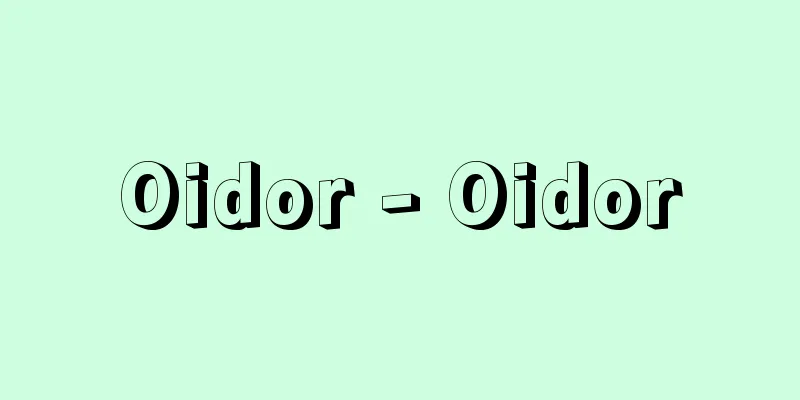Orda - Oruda

|
...the account of a Turk-Mongolian nomadic ruler. It was also called the Horda. Specifically, it refers to the entire set of a ruler's property, including all movable property such as women, children, and livestock attached to the account. [Kazakh]...Governed by customary law and Islamic law, they loved oral literature such as heroic epics, humorous tales, and tragedies of young heroes who devote themselves to pure love. However, in the 17th century, they split into the Great Horde (Lake Balkhash to the Syr Darya), the Middle Horde (central Kazakhstan), and the Little Horde (western Kazakhstan), and weakened. Both the Great and Middle Hordes came under the influence of the emerging Dzungars, but in the mid-18th century, as a result of the Qing Dynasty's annihilation of the Dzungars, they became nominal vassals of the Dzungars, and some of them migrated to northern Xinjiang. ... From the Kipchak Khanate...The founder of the state, Batu (reigned 1227-55), was Jochi's second son. Between 1236 and 1241, he swept across the Kipchak steppe, Russia, and Eastern Europe, and established the foundations of the state with Sarai on the lower Volga as its center. At that time, his eldest brother Orda and others inherited Jochi's main territory (the Irtysh basin) and became the left wing of the state, while Batu, who succeeded to the khanship, occupied territories on the right wing along with his brothers Berke and Shiban. In later historical sources, the territories on the left wing are sometimes called Kök Orda, the Blue Lantern Khanate, and the right wing Aq Orda, the White Lantern Khanate. ... *Some of the terminology explanations that mention "Orda" are listed below. Source | Heibonsha World Encyclopedia 2nd Edition | Information |
|
…トルコ・モンゴル系の遊牧民の君主の帳幕のこと。オルダともいわれた。具体的には帳幕に付属する婦女子,家畜などすべての動産を含めた君主の財産の一そろえをいう。… 【カザフ族】より…慣習法とイスラム法によって律せられ,英雄叙事詩や滑稽話,純愛をささげる若きヒーローの悲劇など,口承文学を愛した。しかし17世紀には,大オルダ(バルハシ湖~シル・ダリヤ),中オルダ(カザフスタン中部),小オルダ(カザフスタン西部)に分裂し,弱体化していった。大・中両オルダは,勃興したジュンガルの勢力下にはいったが,18世紀中葉,清朝によるジュンガル殲滅(せんめつ)の結果,その名目的な藩属国となり,一部は新疆北部へ移住した。… 【キプチャク・ハーン国】より…国家の創設者バトゥ(在位1227‐55)はジュチの第2子で,1236‐41年に,キプチャク草原,ロシア,東欧を席巻し,ボルガ下流のサライを中心として国家の基礎を築いた。その際,長兄オルダOrdaらがジュチの本領(イルティシュ流域)を継いで国家の左翼となり,ハーン位を継承したバトゥは,弟のベルケBerkeやシバンShibanらとともに,右翼に所領を占めた。後の史料では,左翼の所領を青帳ハーン国Kök Orda,右翼を白帳ハーン国Aq Ordaと呼ぶこともある。… ※「オルダ」について言及している用語解説の一部を掲載しています。 出典|株式会社平凡社世界大百科事典 第2版について | 情報 |
Recommend
Gazzetta Veneta - Gazzetta Veneta
…He was active in Venice. Of particular note is t...
Colloquialism - Kougohou
It is used in two senses: (1) the grammar of spoke...
Nernst's equation
…The equilibrium electrode potential E e correspo...
Tenjukoku Embroidery Record
An embroidery work from the Asuka period, also kno...
dowel crown
…The materials used for bridges are the same as t...
Entelecheia (English spelling)
An Aristotelian term meaning in a final state. Acc...
Civil Procedure Code
It has both substantive and formal meanings; in t...
Theory of Observability
When a target system is represented as a linear dy...
Bukō Chronology - Bukō Chronology
This is a chronology-style record of events that ...
New Education - Shinkyoiku
Broadly speaking, it means an attempt at a new ed...
Gulick, JT
…However, it was M. Wagner (1868) who proposed th...
Celery - selori (English spelling) celery
An annual plant of the Umbelliferae family (APG c...
Horseback shooting - Kisha
It is an archery technique in which a horse is mo...
Stresa Front
…Not only that, but the other two countries effec...
Djerma
… [Nobuyuki Hashimoto] [Residents, Society] The m...









